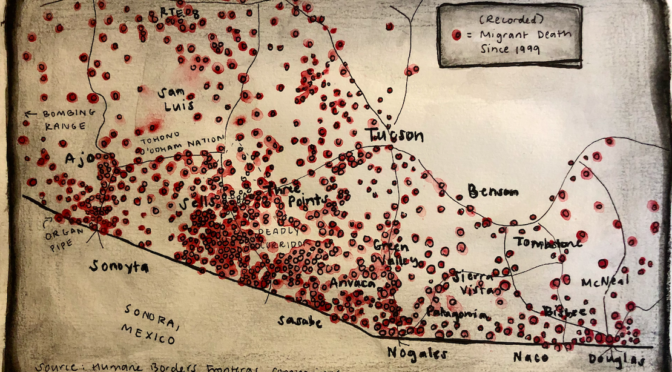Since January, No More Deaths’ Missing Migrant Crisis hotline has logged 6,640 calls in their mission to help migrants lost, injured, and dying in the desert borderlands.
“When we established the hotline in 2017,” an operator remembers, “there were very few of us.
Often it’s a mother calling, consumed with unimaginable pain and worry, searching for her son or daughter. Cases include detention searches and migrants missing in the desert of Arizona, New Mexico, Texas, and California.”
If you Google “Searching for Someone Lost at the Border” or “Persona Desaparecida Arizona,” No More Death’s hotline comes up. When a call comes in, volunteers ask the caller’s relationship to the missing person and where the individual crossed, urging callers to contact their home country consulate. When the person is detained, No More Deaths helps them navigate the detention system, explaining their rights while in detention and how to open a phone account and commissary.
For those seeking asylum, No More Deaths offers legal resources. If the person is not detained, the volunteer ascertains who had the last communication and when, where the person departed from, and any other source of information, such as someone who crossed with them or knew their route. The window for potential rescue is two to five days.
“Our response depends on time frame, whether the missing person has a phone, and their physical condition,” a volunteer explains. “It’s a tremendous emotional strain for the same few people on call, so it’s healthy to build up the team. Soon, there will be eight trained operators. We’ve established protocols for interacting with Border Patrol. We are expanding our relationships with several consulates, the Colibri Center (who works with the Pima County Medical Examiner), the Tohono O’odham Nation, and allied search groups.”
Many families don’t want to talk directly with authorities who work within the system that has deliberately disappeared their loved one. Detention center employees don’t always speak Spanish. Often relatives are put through to an answering machine. The ICE locator is the only public database for detainees, and it can be difficult to navigate or inaccurate because authorities enter the name wrong, and there can be long delays.
“We act as a humane cushion between the family and authorities,” an operator observes. “We give emotional support during recoveries, disappearance, and death. We meet with the family, have
dinner with them, light a candle for their loved one, offer what comfort we can.”
If families can help with a search, No More Deaths teammates take their lead from the family. “We accompany them on searches, assist with logistics and navigating maps, and give moral support,” a volunteer says. “But we have to be clear about our capacity and not give false hope. We try to stay realistic.”
When medical examiners confirm the identity of remains, No More Deaths team members travel to be with the families, if in Arizona or Sonora, Mexico. Struck by the families’ strength and resilience, volunteers strive to uphold their stories, to prevent them from being defined only by a dot on a map, lost in the flood of statistics.
— Katherine Pew, No More Deaths volunteer

